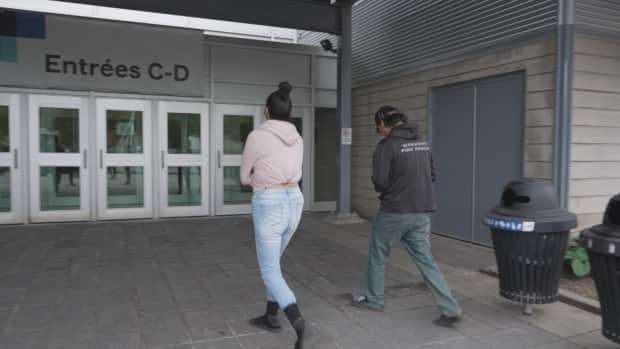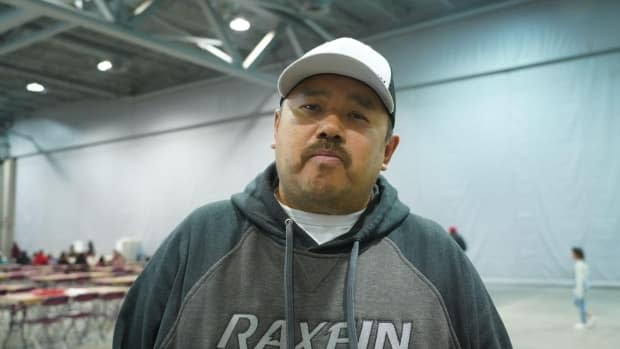After overnight evacuation, Cree Nation of Waswanipi finds shelter, solace in Quebec City

Rhonda Oblin, deputy chief of the Cree Nation of Waswanipi, got teary-eyed speaking in the corner of the ExpoCité centre in Quebec City, less than 24 hours after the start of the evacuation of the community of about 2,000.
She was emotional, thinking about all the people who are still there — including the chief and about half of the town — many of whom live along the trapline permanently. She says 1,012 people left last night as part of the city's evacuation plan, which was announced in the late morning and early afternoon.
"It's been a whirlwind, I can say. Very little sleep, kind of running on fumes and adrenaline," said Oblin, who was among 700 people who travelled to Quebec City by car and bus.
While Waswanipi is not in imminent danger, Oblin says they began the progressive evacuation pre-emptively because of encroaching smoke from wildfires in the region.
"It's very stressful obviously and it's a toll on everyone's mental health as well. I can say they're hanging in there, we're a tough group but definitely it's been quite a trial," said Oblin.
As of Thursday afternoon, Premier François Legault said 13,500 people have been evacuated from their homes across Quebec and 132 fires were active, down from Wednesday's 149. Most of those fires are still out of control.
Indigenous Affairs Minister Ian Lafrenière says the chief of Waswanipi decided to evacuate based on concerns relating to road access and smoke. At a news conference on Thursday afternoon, Lafrenière said other nations, like Mistissini, decided not to evacuate.
Evacuees from Waswanipi settle in
Of those who left Waswanipi, 200 people were welcomed into a shelter set up in ExpoCité, a large venue used for trade shows and entertainment, while others with health conditions stayed in hotels or with friends and family. The deputy chief says the support has been "uplifting."
"We'll always leave Quebec [City] knowing how well we were welcomed and how well we were welcomed by the Huron Nation," said Oblin. "When we picked up the phone, [within] minutes we got a call back and that's always going to be remembered and appreciated."

'Great teamwork': Huron-Wendat chief
Grand Chief of the Huron-Wendat Nation Rémy Vincent said when they heard about the evacuation in Waswanipi, they turned to Quebec City for help because they didn't have the infrastructure to accommodate such a large group of their "Cree brothers and sisters."
"It's a lot of great teamwork, and we're going to make sure that our brothers and sister are as comfortable as possible and hopefully that the forest fires are over soon," said Vincent.
Early in the morning, the Red Cross delivered beds. The city of Quebec provided breakfast, games and 250 pizzas. Quebec City Mayor Bruno Marchand said he hopes that will make the centre feel a "bit like home."

"It wasn't possible to not do [something]. It is a matter of humanity not a matter of what it will cost," said Marchand.
Romeo Ottereyes is one of the 200 staying at the shelter with his five kids. They arrived around 2 a.m. on Thursday after a tiring trip.
"It's hard to leave your community, it's hard to leave your family," " said Ottereyes. "We try to help each other, talk to each other."



